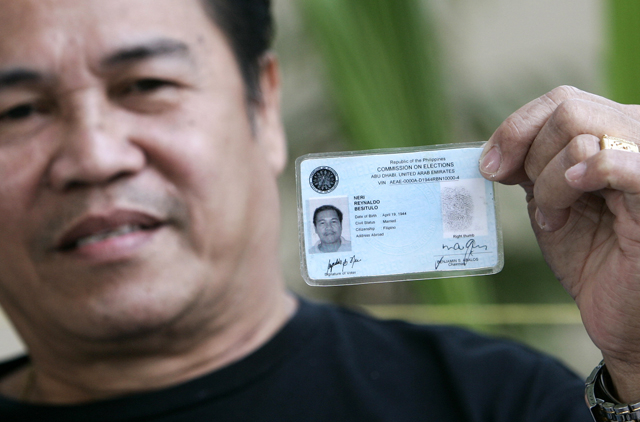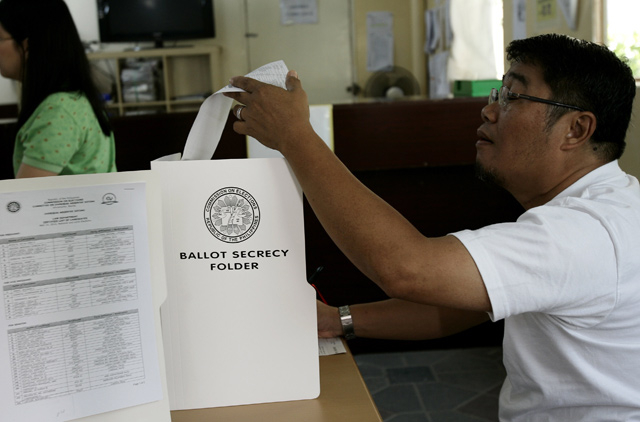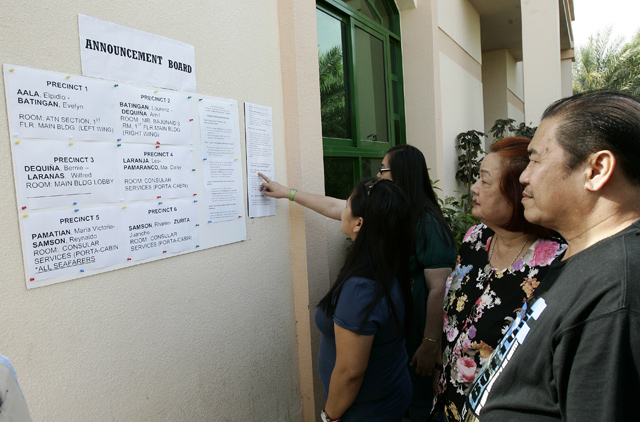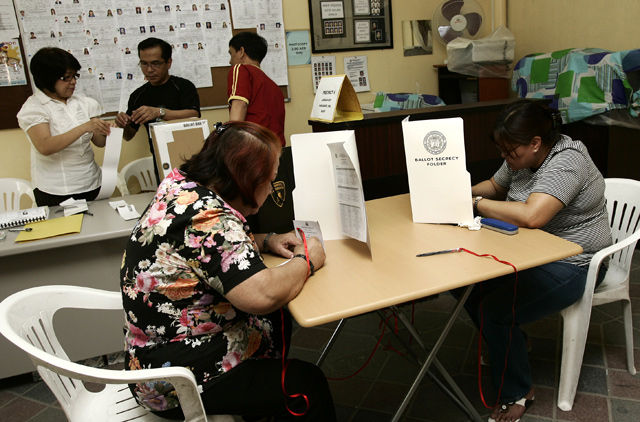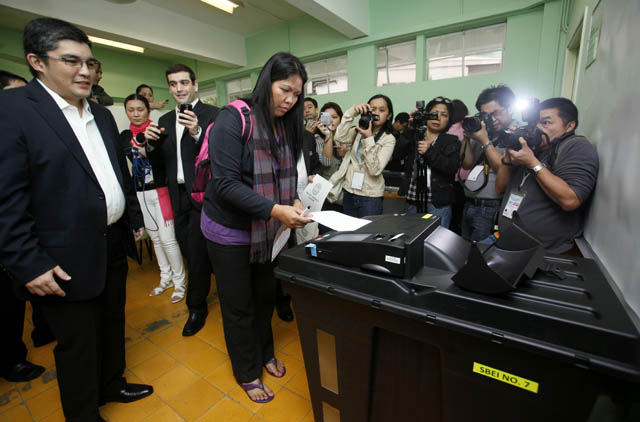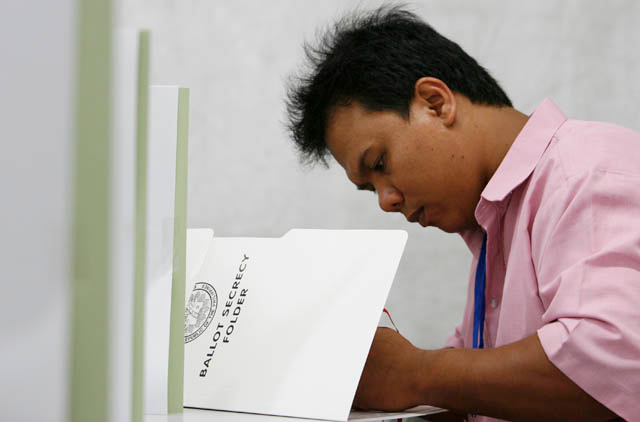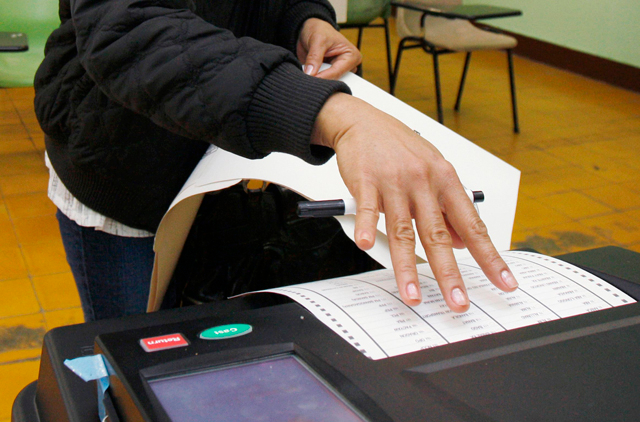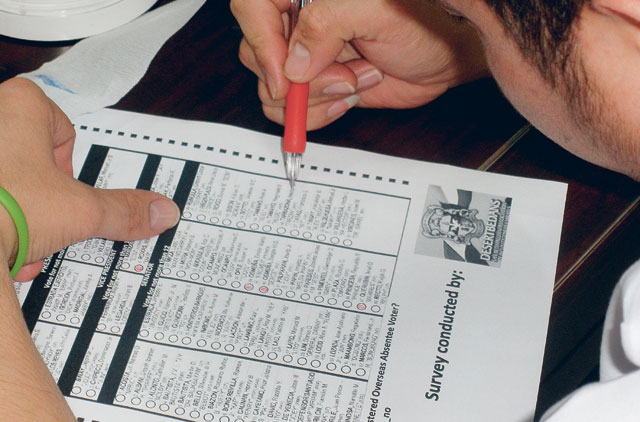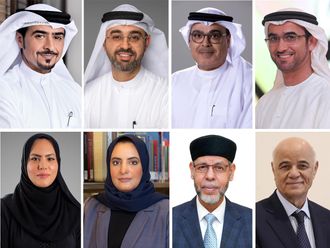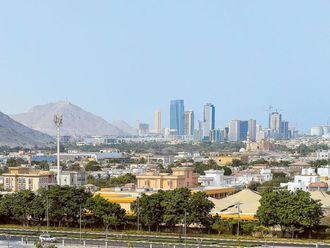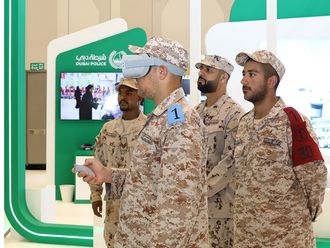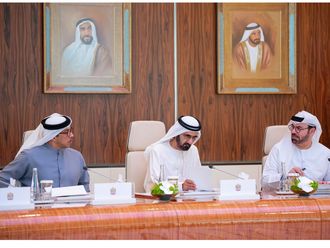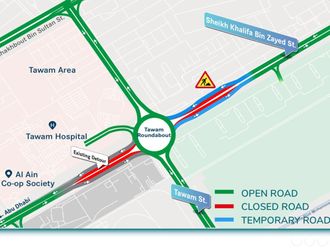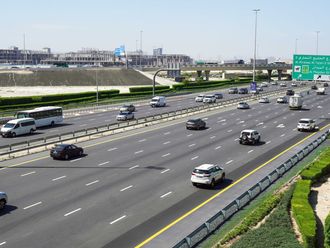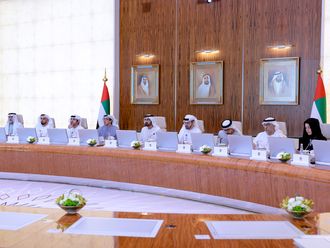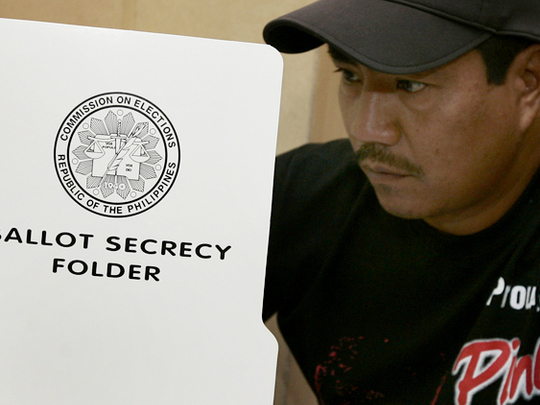
Dubai: Disenfranchised voters and missing names hounded election inspectors on the first day of the month-long absentee voting for Filipino electors at the Philippine Consulate in Dubai on Saturday.
Polling precincts opened at 10 minutes past the appointed starting time as members of the Special Board of Election Inspectors had to account for all the election paraphernalia, including the official ballots, which were brought down from a secured room on the second floor of the villa in Al Ghusais which houses the Philippine mission.
Factfile: The Philippine elections
Voters coming to the consulate were initially directed to a notice board outside the consulates main building where detailed instructions on which polling precinct to approach and how the voting process goes are posted.
Six polling precincts, each manned by three election inspectors, were opened for the 30,642 registered voters in Dubai and the northern emirates. The precincts will be open daily even on weekends from 8.30am to 3pm to accommodate voters.
In a telephone interview conducted ahead of Saturday's polls, Philippine Ambassador to the UAE Grace Relucio Princesa was confident that the voting will run smoothly.
"I dont think there will be technical glitches as the elections here will not be automated," she told Gulf News.
Guide: Absentee voting process in Dubai
Fact file: The automated voting process
Special coverage: Philippine elections
However, the calm and quiet proceedings were cut short after a disgruntled voter engaged an election inspector in an argument, prompting Vice-Consul Edwin Mendoza to intervene.
Angelo Galang Timbol, who has lived in the UAE for 29 years, was not on the list of voters.
"I voted in 2004 but I was not able to vote in 2007 because I was out of the country and now theyre telling me my names not on the list. How could that be?" he said in Filipino, as he showed his voters ID card which was issued by the Commission on Elections (Comelec).
The election inspector however, insisted that Timbols ID card indicated that he had registered in the Philippine Embassy in Abu Dhabi.
As soon as Timbol stepped out of the polling place, another voter encountered the same problem. Reynaldo Neri, a technician at the Lamborghini dealership in Dubai, couldnt find his name on the voters list. Like Timbol, he was told that his name could have been included in the Abu Dhabi list.
"That's impossible. I registered at the [old] consulate in Al Hamriya together with my wife in 2003. Ive been in Dubai for 19 years. I dont even know where the Philippine Embassy is in Abu Dhabi," he said.
From the consulate, Neri immediately went to the Embassy in Abu Dhabi where he was able to cast his vote.
"My name is on their list and I was told that the Comelec probably just placed the names without assessing if the voter had registered in Dubai or Abu Dhabi," he said.
Paulino Menor from Sharjah also sought the help of election inspectors as he could not find his brothers name on the list.
He claims that his brother, Joselito, had registered as an OAV. After examining Joselitos documents, the election inpectors ruled that he is not eligible to cast his ballot in the UAE as he had registered in the Philippine Embassy in Brunei.
Consul Mendoza explained that under the OAV rules, an absentee voter can only cast his ballot in the country where had registered.
"It's good that these problems came out on the first day so we can relay these to the Comelec in Manila," Mendoza said. "We've been advising people to check their registration status the certified list has been online since December."
In a statement posted on the Philippine Department of Foreign Affairs (DFA) website, Undersecretary Rafael Seguis, chairman of the OAV Secretariat, said the nations foreign diplomatic posts are well-prepared to oversee the voting process.
Our personnel have undergone a three-day training in Manila last February to prepare them for their duties in this election, he said.
The DFA moreover, reminded voters to bring their passports or other personal identification documents.
Turnout
Ambassador Princesa said she's expecting a higher turnout of absentee voters compared to the mid-term elections in 2007.
"This year's polls include a presidential election. More people are interested. They really wanted to participate," she said.
A UAE-based Filipino migrant workers group however, disagrees.
Emmanuelle Morona, secretary-general of the group Migrante, said the low ratio between the number of registered absentee voters and the estimated 450,000 Filipino expat population in the UAE is a glaring proof that the Philippine mission failed to reach out to the community here.
Only a small number will participate in the actual elections because of the lack of information from the time voters were supposed to register up to this time that the actual voting has started, Morona told Gulf News in a telephone interview.
Morona, who works in Jebel Ali, attributed the low turnout to the alleged failure of officials to post the complete voters list in the consulates premises.
"How will one know if hes qualified to vote? It's not easy to go the consulate [in Al Ghusais] and that alone the time and distance will turn off people from voting," he said.
Morona's statement was corroborated by a Filipino marketing professional who also claimed there was a failure on the part of consular officials to inform the community about the OAV.
"There was none that I know of. Im a frequent visitor to the consulate and I did not see any poster or announcement whatsoever," the 45-year-old M.M. told Gulf News. A six-year UAE resident, M.M. failed to register as an OAV.
Consular officials vehemently denied the allegations.
"That's not true. We did all that can be done to reach out to the community. In almost all events, the Consul-General as well as other consular officers and staff always make it a point to relay all the necessary information pertaining to OAV," said Consul Edwin Mendoza.
"It's all over the media. Are they not reading the news on the internet? As a responsible citizen, it is also your responsibility to find out whats happening in your home country," Mendoza said.
Mendoza also said there was no need to post the voters list.
The voters list can be accessed on the Comelec website. They can check it online; its faster and very much convenient than coming to the consulate, he said.
Adelio Cruz, first secretary of the Embassy in Abu Dhabi, likewise brushed aside the allegations.
"We were not remiss in informing the community. We went to churches, attended events and community meetings and used [e-mail] groups to relay everything. Do they expect us call each and every one?" Cruz told Gulf News.
Gisela Santos, an HR professional, is among the 17,041 Filipinos who registered as absentee voters in Abu Dhabi.
She said she along with friends personally went to the Philippine Embassy to enquire about the OAV mechanics during the registration period.
"We went straight to the embassy to enquire, she said. If I don't vote, I cannot complain [of bad governance]. Besides, I feel that it is a moral obligation for me [to register and vote]it's the least that i can do for my country," Santos said.
Fact file: Philippine elections
Preparations for the 2001 national elections started as early as April 2008 when the Commission on Elections held consultations with the Philippine Department of Foreign Affairs and the Commission on Filipinos Overseas on how to streamline the voters registration process and ensure a better turnout from an estimated 6.9 million Filipinos based overseas.
The registration period, which was initially planned to start on December 1, 2008, was moved to a February 1, 2009 start. This was done to ensure that the embassies and consulates have enough time to prepare.
The registration period ended on August 31, 2009.
Of the 589,839 registered OAVs worldwide. 47,683 were from the UAE, of which, 17,041 were registered in the Philippine Embassy in Abu Dhabi while 30,642 were listed in the Philippine Consulate in Dubai.
A survey conducted recently by the San Beda College Alumni Association-UAE chapter showed 69.92 per cent of its respondents did not register as OAVs.
Overseas Absentee Voting Act
The Overseas Absentee Voting Act, officially known as the Republic Act number 9189, is a law passed on February 13, 2003 which allows Filipinos — currently residing or working outside of the Philippines — to vote in an election. This act is implemented by the Philippine Commission on Elections (Comelec) with the help of the Department of Foreign Affairs (DFA). Overseas absentee voters (OAVs) may only participate in the election of a President, Vice-President, Senators and Party-List Representatives.
Who are qualified to vote
- Filipino citizens, not otherwise disqualified by law.
- At least 18-years of age as of May 10, 2010.
- Registered as an overseas absentee voter (OAV).
Voting period
OAVs may cast their votes from April 10 to 10 May 2010 from 8.30am to 4.30pm every day, except on the last day (May 10) when voting will be from 8.30am to 2pm to coincide with the closing hour (6pm) in the Philippines.
Modes of voting
- Personal Voting - OAVs whose application to vote in absentia has been approved shall cast their ballots personally at any time within the voting period. This is the mode of voting to be implemented in the Embassy in Abu Dhabi and the Consulate General in Dubai.
- Voting By Mail - Electoral mails are sent by the Commission on Election (Comelec) directly to the OAVs, based on their addresses registered in the Certified List of OAVs database. Voters will receive a packet that contains the ballot and envelopes to seal and send/deliver the ballot. It also contains a certified list of candidates and instructions on how to cast their votes.
- Modified Voting By Mail - Electoral mails are sent by the Comelec directly to the Foreign Service Posts (embassies and consulates) . These in turn will distribute the electoral mails to the OAVs.
Key information
For more information on overseas absentee voting, please visit the Comelec website at www.comelec.gov.ph. Read special coverage of the Philippine elections
Will you be voting? How do you keep track of developments in the Philippines while living in the UAE?


